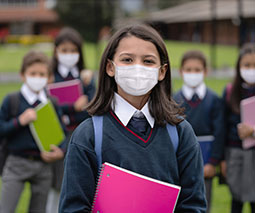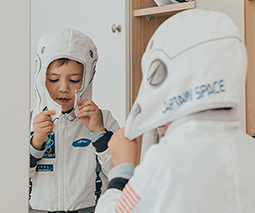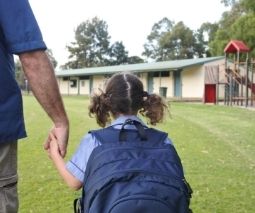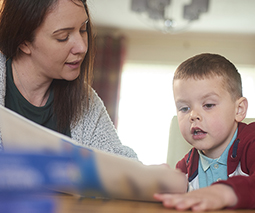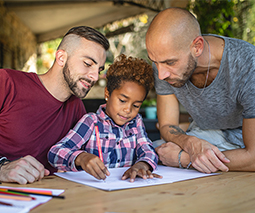What kids really need when starting school for the first time
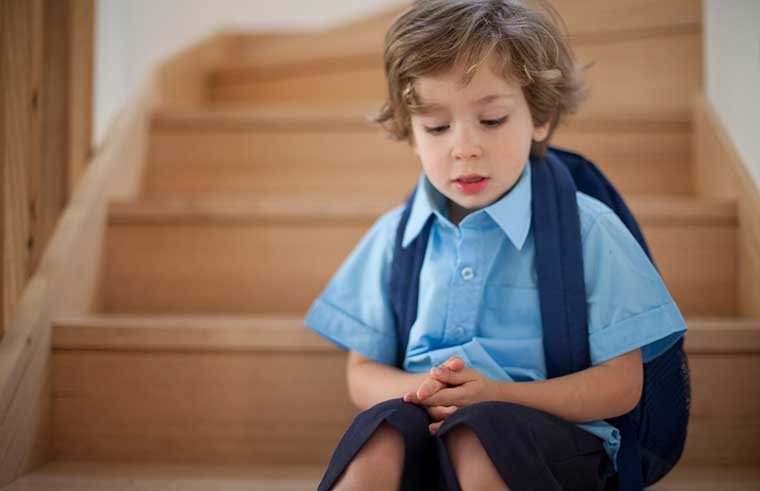
It’s almost the end of the year, and with that brings a time for some much-needed rest. But for some, it also means Big School is just around the corner.
Anthony Semann is an early education consultant at Semann and Slattery. He says that while some parents might be freaking out, kids are generally pretty excited about starting school – as long as you stay calm.
“I think the problem we have as parents is we share war stories with them. You know, ‘Oh, school wasn’t kind to me,’ or ‘Oh, I didn’t like my kindergarten teacher.’ All you’re doing is instilling the fear of God in these poor four-year-olds,” says Anthony.
“Children, for the most part, are pretty excited about this transition. As long as we don’t start talking about it from February. There’s so much prepping that happens between February and January the next year. That’s a long time in the life of a child.”
Listen to Anthony Semann on Feed Play Love:
Is my child ready for school?
By this time of the year, you’ve probably already decided if you’re going to send your child to school next year. But if you are still having doubts, Anthony says people usually worry about whether their kid can read or write – and it’s great if they can – but it’s not what school readiness means.
“All the research asks, is your child emotionally ready for this transition?” says Anthony.
“But there are some other things that are important for children – like, can they make independent decisions? Can they follow two or three instructions? Ask him to go to the fridge, get an ice cream and come back. It’s about following a sequence of ideas. And that’s really important because schools operate like that.”
Other questions to ask yourself include: Does he separate well from you? And, does he get on with and communicate with other children?
Don’t be concerned, though, if your child doesn’t talk much to you.
“They may not talk to you. I think most children find their parents quite boring. But we want them to interact with other children, and they may interact in other contexts.
“It may not mean they talk at the dinner table, but when they’re with other children, people they like, do they interact? Can they concentrate on the task?”
Lastly, how does he cope when frustrated?
“How do they deal with it? You know, do they melt and then do you melt as well? Because school will lead to some frustration.”
“What would have made school easier for you?”
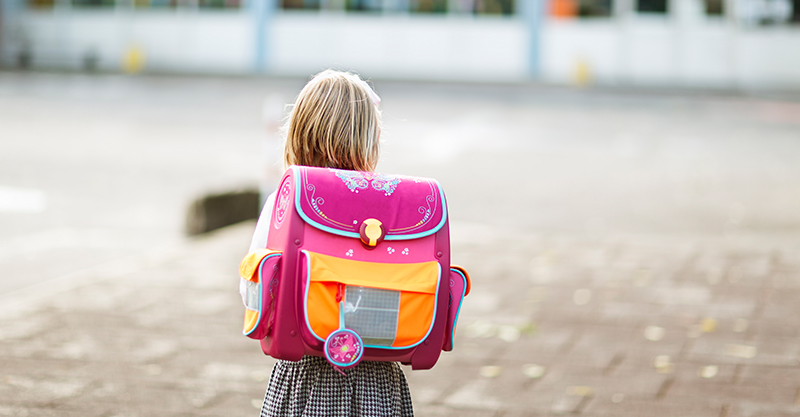
To find out what kids really need when transitioning to school, Anthony decided he’d ask them. He interviewed 400 children three months after they started school, and asked them all the same question: “What would have made school easier for you?”
And the most common response makes total sense.
“The number one thing that came out was, ‘I wish someone had told me the rules’,'” explains Anthony. “Like ‘don’t be cheeky’. Another child said, ‘I wish someone had told me I wasn’t allowed to touch the piano in the classroom.’ He’s like, ‘Why have it here?’ And I thought, well, that’s a really good question.
“Another child said, ‘You have to sit on the floor when the teacher plays the triangle.’ And I said, ‘Yes.’ And he said, ‘Well, in daycare, that’s when you start to dance’.”
Yep, these new school rules can be down-right confusing.
Another big theme to come out of Anthony’s interviews was a big fear of the bathroom.
“You know, in daycare, the bathroom is the networking space. You go in there, you talk to your friends, you exchange war stories,” says Anthony.
“Well, then they go into these schools with these high ceilings in the bathrooms and no soap. Now, remember, we’ve constantly told children, wash your hands, wash your hands. They go into this germy space. They’re like, ‘Where’s the soap?’ And they all freak out. And then they have to learn how to lock the door and use the toilets alone.”
Little things parents can do to help
If your child is ready to go to school, there are some really simple things you can do to prepare them during the school holidays before they begin, according to Anthony.
- Drive past the school: “Point it out and tell nice stories. If you don’t have any, make them up.”
- Let them wear their school shoes over the summer break: “There’s nothing worse than wearing new school shoes for seven hours on your first day.”
- Teach them how to use a bubbler: “Teach your child how to use a bubbler because that’s what they’ll be using in schools.”
- Teach them how to use a lunch box: “Start packing lunches over the summer break even if you’re not going anywhere. Use that lunch box, so they know how to use it.”
- Set up playdates: “Find out who’s going to what school and hang out over the summer break together.”
What to expect once school begins
Feeling overwhelmed:
Your child will be feeling lots of things after a day at their new big school. As hard as it might be, try not to bombard your child with a bunch of questions as soon as you see them at the school gate. The who, what, when, where, and why’s can wait.
A chat during dinner or bath time can be great times to catch up on the details – after they’ve had a chance to relax and unwind from their big day.
Making friends:
If you are worried about your child making friends, reach out to their teacher and see how they’re going.
“It takes a while to warm up to other children. And there can be this expectation that you’ve got a friend for life after the first week of school. And that’s not what it’s about, because sometimes those questions [about making new friends] can induce anxiety in children,” warns Anthony.
So, keep the chats about school friends casual. Rather than asking, “Did you make any new friends today?”, perhaps ask instead, “Who did you sit with in the classroom? or “Did you play any games at lunch time?”
“In time,” says Anthony, “they will find their mojo and find their gang that they like to hang out with.”
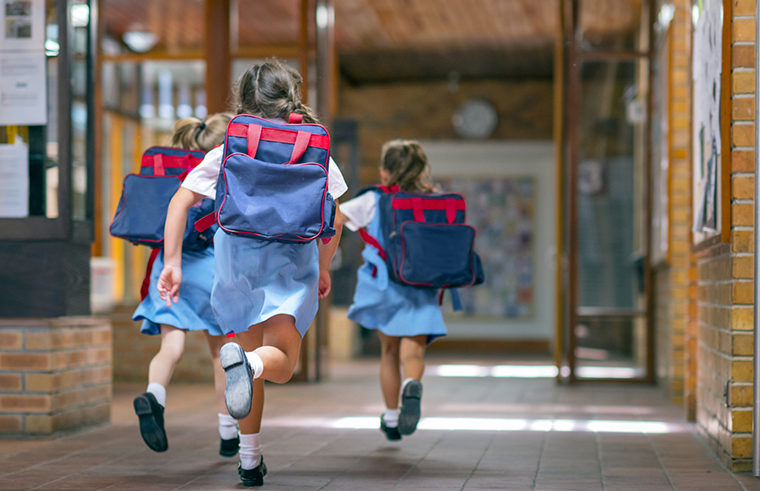
Feeling tired:
They will also be exhausted. The jump to five days at school is huge for little ones.
“Be prepared to do nothing that weekend,” says Anthony. “Go to the beach; chill. Keep them away from other family members because they’ve just been in big groups all week and they’re probably yearning to hang out with you as a parent and have a little us-time.”
Parental anxiety: The emotional rollercoaster
As for mum and dad, Anthony says be prepared for the emotional rollercoaster. Starting school is a significant milestone for both parents and children.
“We look at it from an ecological model. It doesn’t just affect the child; it affects the community. The extended family and the parents,” says Anthony.
Anthony’s hot tip for parents is to do all the prep the night before the very first day of school, “instead of running around like a headless chook,” so you can spend more time with your child the morning.
Last but not least, mum or dad – take the first day off!
“If you can get the day off, get the day off. Don’t go to work. You sit there sobbing, looking at photos on your phone, wanting empathy from your colleagues. Treat yourself. Go and do something with the girlfriends or your boyfriends,” says Anthony.
As for pick up time:
“Don’t go to the school two hours beforehand, because that’s going to seem like a really long time.”
Our ‘baby’ starting school is a huge milestone for parents, especially for our first child. We are going through a lot of big feelings, too!
“Just be aware that we as parents will be going through the same thing that our child will be going through, and that it’s okay to say I’m not okay.”
Best of luck to all of our brand new school kids and parents. You’ve got this!
 Need some support to be the best parent you can be? Our Parent School parent coaching experts can help. Click to find out more or book a one-on-one session.
Need some support to be the best parent you can be? Our Parent School parent coaching experts can help. Click to find out more or book a one-on-one session.

